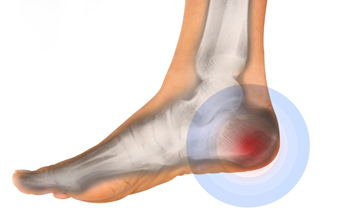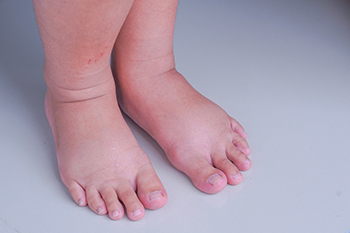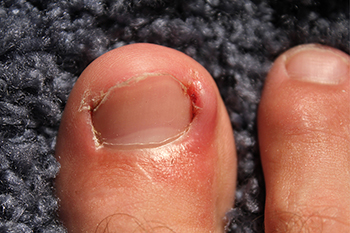Connect With Us
Blog
Items filtered by date: March 2023
What Can Trigger Erythromelalgia?

A rare condition that is known as erythromelalgia can cause a consistent, intense burning sensation in the feet. It can alter the quality of life, despite the fact it is not a fatal condition. Additional symptoms that are associated with this condition can include swelling, tenderness, and a burning feeling that can radiate to the entire foot. The symptoms often affect both feet and can be severe. This condition may develop from genetic reasons, and can happen as attacks. They can begin with itching, and may progress to severe pain. These attacks can be triggered by warm weather, sweating, exercise, or being immobile for long periods of time. If you are experiencing any of these symptoms, it is strongly suggested that you are under the care of a podiatrist who can properly diagnose and prescribe medication that may help the symptoms of erythromelalgia.
Some foot conditions may require additional professional care. If you have any concerns, contact one of our podiatrists of Foot Surgery Specialists of Texas. Our doctors can provide the care you need to keep you pain-free and on your feet.
Rare Foot Conditions
The majority of foot conditions are common and can be treated by a podiatrist. Standard diagnostic procedures are generally used to identify specific conditions and treatment can be rendered. A podiatrist also treats rare foot conditions which can be difficult to diagnose and may need extra attention and care.
There are many rare foot conditions that can affect children. Some of these can include:
- Freiberg’s disease
- Kohler’s disease
- Maffucci syndrome
Freiberg’s disease - This can be seen as a deterioration and flattening of a metatarsal bone that exists in the ball of the foot. It typically affects pre-teen and teenage girls, but can affect anyone at any age. Symptoms that can accompany this can be swelling, stiffness, and the patient may limp.
Kohler’s disease - This often targets the bone in the arch of the foot and affects younger boys. It can lead to an interruption of the blood supply which ultimately can lead to bone deterioration. The patient may limp or experience tenderness, swelling, and redness.
Maffucci syndrome - This affects the long bones in a child’s foot leading to the development of abnormal bone lesions. They are benign growths and typically develop in early childhood and the bones may be susceptible to breaking.
A podiatrist can properly diagnose and treat all types of rare foot conditions. If your child is affected by any of these symptoms or conditions, please don’t hesitate to call our office so the correct treatment method can begin.
If you have any questions please feel free to contact our offices located in River Oaks and Sharpstown in Houston, TX . We offer the newest diagnostic tools and technology to treat your foot and ankle needs.
A Common Reason to Have Heel Pain

Many people will experience heel pain at some point in their lives. There are various reasons why heel pain can develop, and it may gradually become worse if prompt medical attention is not received. A common cause of heel pain is the foot condition that is known as plantar fasciitis. This happens when the plantar fascia becomes torn or inflamed. This can be a runner’s worst nightmare, and running is often stopped until treatment is completed. Heel pain and the corresponding conditions that caused it may be prevented by losing weight, if applicable, and maintaining healthy eating habits. Additionally, it is beneficial to wear appropriate shoes, and this may include choosing shoes that have a low and cushioned heel. If you have heel pain for any reason, it is suggested that you schedule a consultation with a podiatrist as quickly as possible who can determine the cause and offer correct treatment procedures.
Many people suffer from bouts of heel pain. For more information, contact one of our podiatrists of Foot Surgery Specialists of Texas. Our doctors can provide the care you need to keep you pain-free and on your feet.
Causes of Heel Pain
Heel pain is often associated with plantar fasciitis. The plantar fascia is a band of tissues that extends along the bottom of the foot. A rip or tear in this ligament can cause inflammation of the tissue.
Achilles tendonitis is another cause of heel pain. Inflammation of the Achilles tendon will cause pain from fractures and muscle tearing. Lack of flexibility is also another symptom.
Heel spurs are another cause of pain. When the tissues of the plantar fascia undergo a great deal of stress, it can lead to ligament separation from the heel bone, causing heel spurs.
Why Might Heel Pain Occur?
- Wearing ill-fitting shoes
- Wearing non-supportive shoes
- Weight change
- Excessive running
Treatments
Heel pain should be treated as soon as possible for immediate results. Keeping your feet in a stress-free environment will help. If you suffer from Achilles tendonitis or plantar fasciitis, applying ice will reduce the swelling. Stretching before an exercise like running will help the muscles. Using all these tips will help make heel pain a condition of the past.
If you have any questions please contact our offices located in River Oaks and Sharpstown in Houston, TX . We offer the newest diagnostic and treatment technologies for all your foot and ankle needs.
Why Are My Feet and Ankles Swollen?

The feet and ankles are likely areas where excess fluid in the body can accumulate. The medical term for this is called edema, and swelling of the feet is a common condition. This swelling can occur for various reasons, including obesity, eating foods that are salty, and taking certain medications. Additionally, many pregnant women suffer from swollen feet and ankles, and this is a normal part of pregnancy. Swollen feet may also happen due to an allergic reaction, such as an insect bite or sting, or from an ankle injury. It is possible that swollen feet can be reduced by limiting sodium intake, gently stretching and exercising, and frequently elevating the feet. It can be beneficial to sit for short periods of time with the feet elevated and to wear shoes that fit correctly. If you have swollen feet or ankles, it is suggested that you speak with a podiatrist who can determine what the reason is and provide treatment solutions.
Swollen feet can be a sign of an underlying condition. If you have any concerns, contact one of our podiatrists of Foot Surgery Specialists of Texas. Our doctors can provide the care you need to keep you pain-free and on your feet.
Swollen feet are a common ailment among pregnant women and people who stand or sit for extended periods. Aging may increase the possibility of swollen feet and patients who are obese often notice when their feet are swelling too. There may be medical reasons why swollen feet occur:
- Phlebitis - A condition that causes the veins to become inflamed and can also cause leg pain.
- Liver disease - This may lead to low blood levels of albumin which is a protein. This can cause fluid in the blood to pass into the tissues and several areas of the body can become swollen.
- Heart failure - When the heart doesn’t pump properly the blood that is normally pumped back to the heart can pool in the veins of the legs causing swollen feet.
- Kidney disease - One of the main functions of the kidneys is releasing excess fluid in the body. This type of condition can make it difficult for the kidneys to function properly, and as a result the feet may become swollen.
- Deep-vein thrombosis (DVT)- This is a serious condition where blood clots form in the veins of the legs. They can block the return of blood from the legs to the heart which may cause the feet to swell. It is important to be treated by a podiatrist if this condition is present.
Swollen feet can also be caused by bone and tendon conditions, including fractures, arthritis, and tendinitis. Additionally, there may be skin and toenail conditions and an infection may cause the feet to swell. Patients who take medicine to treat high blood pressure may be prone to getting swollen feet.
Many patients elevate their feet to help relieve the swelling and this is generally a temporary remedy. When a podiatrist is consulted the reason behind the swelling can be uncovered and subsequently treated.
If you have any questions please feel free to contact our offices located in River Oaks and Sharpstown in Houston, TX . We offer the newest diagnostic tools and technology to treat your foot and ankle needs.
Causes and Symptoms of an Ingrown Toenail

There is no mistaking the pain from an ingrown toenail. The big toe is typically affected, and it can be difficult to wear shoes. An ingrown toenail can develop when it grows into the skin instead of over it, and the pain can cause prompt medical attention to be sought. Symptoms that are associated with an ingrown toenail can include severe tenderness, swelling, and the toe may become red. The most common reason to develop this ailment is from wearing shoes that are too tight, followed by trimming the nails incorrectly. Additionally, it may happen from a toe injury, or if the nails are naturally curved. Soaking the affected foot in warm water may temporarily bring mild relief. This often makes it easier to push the nail away from the skin using a piece of cotton. Ingrown toenails can become infected. It is suggested that you consult with a podiatrist who can effectively treat this condition before it becomes more serious.
Ingrown toenails may initially present themselves as a minor discomfort, but they may progress into an infection in the skin without proper treatment. For more information about ingrown toenails, contact one of our podiatrists of Foot Surgery Specialists of Texas. Our doctors can provide the care you need to keep you pain-free and on your feet.
Ingrown Toenails
Ingrown toenails are caused when the corner or side of a toenail grows into the soft flesh surrounding it. They often result in redness, swelling, pain, and in some cases, infection. This condition typically affects the big toe and may recur if it is not treated properly.
Causes
- Improper toenail trimming
- Genetics
- Improper shoe fitting
- Injury from pedicures or nail picking
- Abnormal gait
- Poor hygiene
You are more likely to develop an ingrown toenail if you are obese, have diabetes, arthritis, or have any fungal infection in your nails. Additionally, people who have foot or toe deformities are at a higher risk of developing an ingrown toenail.
Symptoms
Some symptoms of ingrown toenails are redness, swelling, and pain. In rare cases, there may be a yellowish drainage coming from the nail.
Treatment
Ignoring an ingrown toenail can have serious complications. Infections of the nail border can progress to a deeper soft-tissue infection, which can then turn into a bone infection. You should always speak with your podiatrist if you suspect you have an ingrown toenail, especially if you have diabetes or poor circulation.
If you have any questions, please feel free to contact our offices located in River Oaks and Sharpstown in Houston, TX . We offer the newest diagnostic and treatment technologies for all your foot care needs.
Reminder: When Was the Last Time...?
Blog Archives
- July 2024
- June 2024
- May 2024
- April 2024
- March 2024
- February 2024
- January 2024
- December 2023
- November 2023
- October 2023
- September 2023
- August 2023
- July 2023
- June 2023
- May 2023
- April 2023
- March 2023
- February 2023
- January 2023
- December 2022
- November 2022
- October 2022
- September 2022
- August 2022
- July 2022
- June 2022
- May 2022
- April 2022
- March 2022
- February 2022
- January 2022
- December 2021
- November 2021
- October 2021
- September 2021
- August 2021
- July 2021
- June 2021
- May 2021
- April 2021
- March 2021
- February 2021
- January 2021
- December 2020
- November 2020
- October 2020
- September 2020
- August 2020
- July 2020
- June 2020
- May 2020
- April 2020
- March 2020
- February 2020
- January 2020
- December 2019
- November 2019
- October 2019

